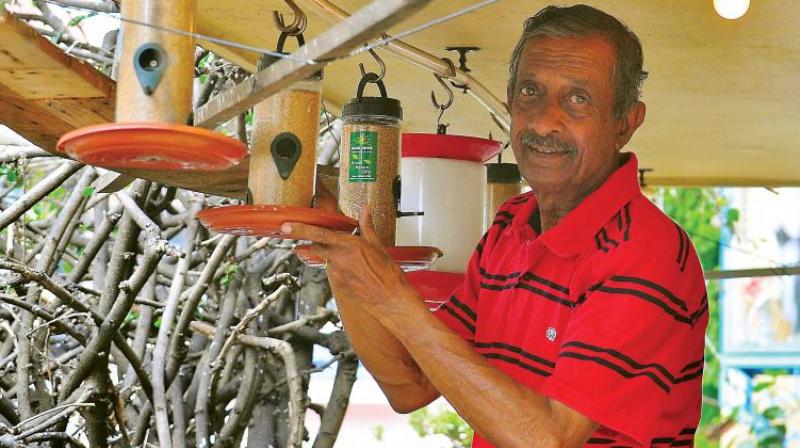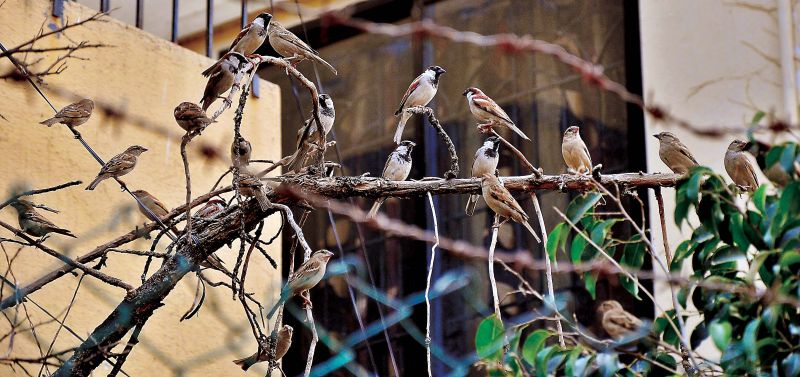Urban Legend: For sparrow-man' birds come first

On March 20, we celebrate World Sparrow Day, paying tribute to a species that has been nearly wiped out for good as reduced green cover and fewer open spaces destroyed their habitat. Amidst the chaos of development, however, is a little haven for the few hundred birds that remain. Edwin Joseph, affectionately known as the “sparrow-man” talks to Darshana Ramdev about a decade-long passion that has helped revive the near-extinct Indian sparrow.
Directions to Edwin Joseph's house are provided by two schoolboys, who pause for a moment in confusion at the mention of his name. "He's the sparrow-man, do you know where he lives?" Recognition dawns and they point us to the place, where a cloud of sparrows rise up into the air to mark our approach. His house on Gospel Street, just shy of Lingarajpuram, is a haven for the Indian sparrow – the only place, in the city, in fact, where they are seen in such profusion.
Joseph pulls up a few chairs and settles us on the front porch of the house – a feeding schedule has been scrawled in blue chalk on the white wall of the house, detailing their daily menu which includes breakfast, lunch, snacks and dinner. A line of containers filled with grain hang from the ledge above, supported by a plastic base. The sparrows dart in and out of these, lining the compound wall and nestling into the three small trees in his garden. Joseph sits in full view of the gate, calling out greetings to all the passers-by, as is his wont. A former state-level athlete, he also trains children at the playground nearby for an hour each afternoon and he issues instructions to the ones who walk past, along with warnings against throwing stones at the sparrows!
"A lot of people think I'm crazy," he said, with unflinching candour. "They can't believe I cook especially for the birds. It's unfathomable that someone would take all this trouble over sparrows!" He does, nevertheless, along with his ever-supportive wife, Sarah, with whom all this began.
"My wife used to sit outside in the garden to clean rice and sparrows would come," said Joseph. "We started throwing them handfuls and that's really how it started!" As the time came for Joseph to retire from his post at BEML, where he had worked for 39 years, he found, to his consternation, that he would receive a monthly pension of Rs 1600! It spelled the end of his sprawling garden, which was replaced by a house he could let out. The sparrows simply shifted base to the lemon and hibiscus trees in the porch – Joseph is as protective of his garden as he is of the birds that visit it!
“My lemon tree is dead,” he said. “I tried to get a new one from the BBMP – there they are,” he points at two dried-out specimens that have been left in a corner in silent testimony of the apathy he has received from officials. “I asked for full-grown trees to be placed in my garden and I’m willing to pay for them, if it means the sparrows have a place to stay. If that happens, they will be around long after I am gone.”
The couple’s day begins at 5.30 am – the birds see to that! “They arrive chirping at my window and stay there until I get up to feed them,” he laughs. “My day begins only after the containers are full of food and water.” They even have a fridge to themselves, always well-stocked with large vessels of cooked rice, different kinds of grain and eggs. “50 kilos of millet lasts us 40 days,” said Joseph, who now keeps his sparrows on a vegetarian diet. “Apart from that, the birds get whatever is cooked at home – rice, chappatis, snacks.”

Changing lifestyles, reduced green cover and less open space resulted in a wipeout of the sparrow population in Bengaluru. “People used to clean grain outside their houses, to which sparrows would flock. “Now, gardens have given way to high-rises, so there’s no place for them to go.” Cell phone towers, he added, proved almost apocalyptic – “You never see them in the vicinity of these towers.” Joseph has managed to successfully fend off attempts to install towers in his neighbourhood – so far. “That’s another reason why the birds come here at all.”
Despite the little haven he has managed to provide, keeping the sparrows safe from harm is a full-time job, what with fending off truant kids with catapults, keeping an eye out for the dreaded ‘pigeon-hawk’ as it is colloquially known and ensuring that neighbourhood cats are kept at bay. “The other day, I had to run after a young man and confiscate the catapult he had hidden in his pocket,” said Joseph. “I even encroached government land,” he smiled, pointing to the small patch of pavement outside his house, where three trees stand, protected by a grill. “I also called the corporator and showed it to him!”
We stay to watch a round of feeding. Joseph’s wife, Sarah, emerges too and the couple line the top of the compound wall with boiled rice. “There’s usually quite a crowd of birds, but they’re shy around visitors,” he remarked. They do arrive, however and the air is filled with excited chirping as they jostle one another for space. “This is how I spend my afternoons,” he smiled. “I skip my nap and sit outside with a cup of tea to watch the sparrows.”
A neighbour drops by with bits of cake, which he duly deposits on the wall. “He comes by everyday,” remarked Joseph, who asks his neighbours to leave tureens of water for the sparrows every morning. “That’s all it takes, but not too many people are willing to make the effort, which is a pity. I tell my kids that they can choose their religion but they’re human beings first. A little kindness can go a long way.”

